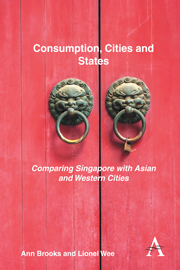Book contents
- Frontmatter
- Contents
- Acknowledgments
- Introduction
- Chapter 1 Consumption, Reflexivity and Citizenship in Global Cities
- Chapter 2 Orders of Reflexivity
- Chapter 3 Rescaling for Competitiveness
- Chapter 4 The Dynamics of State–Society Negotiations
- Chapter 5 (De-)Regulating Asian Identities: Comparing Asian Cities and States
- Chapter 6 Citizenship, Reflexivity and the State: Investigating ‘Defensive Engagement’ in a City-State
- Chapter 7 Governing the Citizen-Consumer: Citizenship, Casinos and ‘Cathedrals of Consumption’
- Chapter 8 Regulating Consumption and the ‘Pink Dollar’
- Chapter 9 States as ‘Midwives’ to Cities: Cosmopolitanism, Citizenship and Consumption in the Modern State
- References
- Index
Chapter 3 - Rescaling for Competitiveness
Published online by Cambridge University Press: 05 September 2014
- Frontmatter
- Contents
- Acknowledgments
- Introduction
- Chapter 1 Consumption, Reflexivity and Citizenship in Global Cities
- Chapter 2 Orders of Reflexivity
- Chapter 3 Rescaling for Competitiveness
- Chapter 4 The Dynamics of State–Society Negotiations
- Chapter 5 (De-)Regulating Asian Identities: Comparing Asian Cities and States
- Chapter 6 Citizenship, Reflexivity and the State: Investigating ‘Defensive Engagement’ in a City-State
- Chapter 7 Governing the Citizen-Consumer: Citizenship, Casinos and ‘Cathedrals of Consumption’
- Chapter 8 Regulating Consumption and the ‘Pink Dollar’
- Chapter 9 States as ‘Midwives’ to Cities: Cosmopolitanism, Citizenship and Consumption in the Modern State
- References
- Index
Summary
Introduction
A major impetus for state initiatives comes from the changing relationship between a modernist state and the late modern conditions of existence. That is, states need to adapt to the more uncertain and plural conditions of late modernity. In doing so, some states may find it strategically valuable to reinvent themselves. Given that we are concerned with global city aspirations, the adaptions that states need to make if such aspirations are to be fulfilled become of interest. Unlike modernist states, which tend to be focused on developing unity as a nation, cities are mainly associated with the functions of residence and business. Cities do not carry the same connotations of commitment to a national identity; instead, they are better able to conceptually accommodate a culturally plural and diverse population. The idea of a global city inherits these properties of a city, but adds to them other properties such as extensive importance and modernizing influences in the global context.
In this chapter, we approach this pursuit of a global city descriptor in terms of a ‘politics of scale’ (Herod and Wright 2002, 13), showing how attention to scale negotiation provides insights into the state's attempts to demonstrate its commitment to multiple scales (nation-state, global city). This discussion provides an ideal illustration of second-order institutional reflexivity. We draw on examples from Singapore to explain the state's attempts to convince Singaporeans of the strategic value of transforming Singapore into a global city.
- Type
- Chapter
- Information
- Consumption, Cities and StatesComparing Singapore with Asian and Western Cities, pp. 37 - 52Publisher: Anthem PressPrint publication year: 2014



